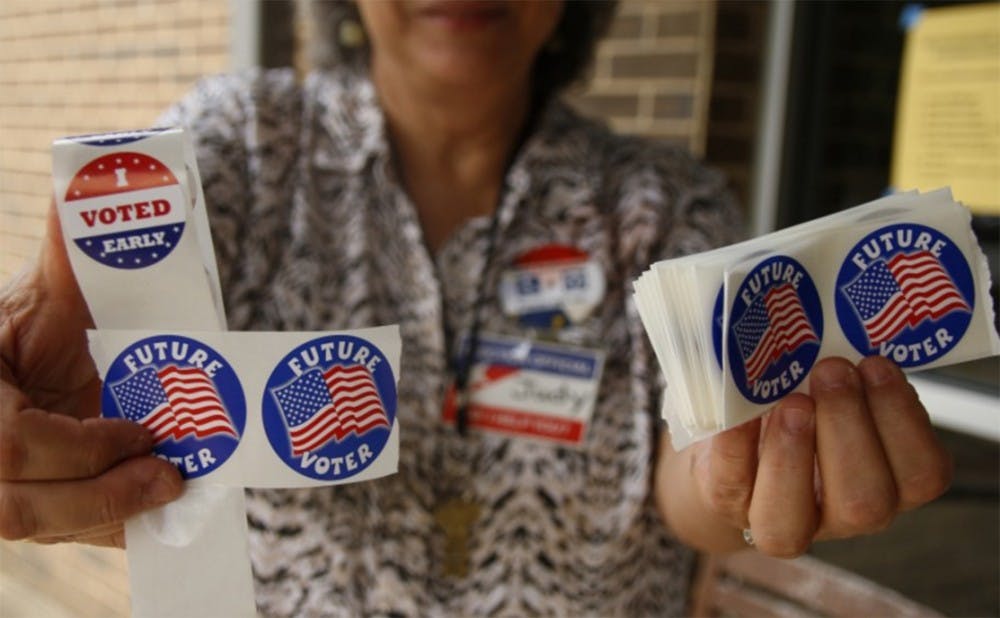“Don’t boo. Vote.” President Barack Obama spoke those words to a heady crowd at the 2016 Democratic National Convention. I remember that night. There was a buzzing optimism in the air. Hillary Clinton was on track to be the next president. Trump seemed a farce: a side-show within the side-show of a Republican party scrambling to find anyone who stood a chance against Clinton’s momentum. On the day of the election The New York Times gave Clinton an 85 percent chance of winning.
Obama spoke with a preacher’s verve, and that night was the closest he ever came to prophecy. CNN would report that voter turnout in 2016 fell to a 20-year low. Only 55.4 percent of Americans voted. Granted, Duke did beat the national average. Eighty-two percent of our registered voters went to the polls. But just over half of our eligible voters actually turned out. That is an embarrassment. We failed.
And now, the Blue Wave may be a non-event. That future state on which we’ve pinned all our hopes of impeachment and dreams of rebuilding may never happen. From CNBC, Democrats’ lead in polling “has been narrowing in recent weeks,” in an echo of the Republican midterm coup in 2014. As early as January, Politico cautioned against faith in the Blue Wave for a glut of reasons, from the failure of conventional polling to predict the outcome of the 2016 presidential election to idiosyncrasies in state election systems to changes in the President’s popularity. The Washington Post puts the uncertainty gently: “Strategists differ on just how powerful and pervasive the forces are ahead of the November balloting.”
In sum, Democrats’ chest-thumping about the coming Day of Judgment is increasingly precarious. If Democratic-leaning voters—especially young voters—are as irresponsible in the midterms as they were in 2016, then their hopes of ousting the powers-that-be will remain a pipe dream. If only there were some way to ensure that the Blue Wave comes crashing in.
It exists, and it is called “voting.”
The way we vote—the way that our government is designed, in fact—was designed to ensure that if something goes belly-up, We the People can fix it. Per The Atlantic, James Madison spent the two years preceding the Constitutional Convention researching how previous democracies had failed. America was purpose-built to right itself when something went wrong. There is nothing wrong in our country that your vote cannot fix.
Consider what happened this past week. Are you irate that the Senate confirmed Brett Kavanaugh? Vote and elect new senators. Are you mad that more senators did not fight the nomination of a judge whom you believed unfit to serve? Vote and elect senators who will better represent you.
Consider, per CBS, that the United States of America is currently holding 12,800 children in detention. Is that a good enough reason to vote? Consider, per The New York Times and a study by The George Washington University, that Puerto Rico’s recovery is still underfunded despite massive damage and a death toll after Maria near three thousand. Is that a good enough reason to vote? Consider the school-to-prison pipeline, gerrymandering, voter suppression or anything at all that sends us Duke students into a righteous rage. Are any of these a good enough reason to vote?
Problems happen in democracy. Voting is the solution. Not voting perpetuates the problem. All our line-toeing talk of taking back the country or taking to the streets will remain talk if we do not do the bare minimum and vote. Do you want someone to listen to you? Vote. Do you want your voice to matter? Vote.
It is anyone’s prerogative to ignore you. It is your privilege to compel them to listen with you vote.
So, go to sites.duke.edu/dukevotes and do what you must to vote in North Carolina or your home state. North Carolina registration closes on Friday and it takes a whopping five minutes. Early voting opens Oct. 17 and closes Nov. 3. Put your talk into action and vote.
I leave you with an axiom from Confucius: his steady rigor is a welcome relief from our current moment of new-minute, new-crisis. Upon finding some problem, the good person looks first into themselves for fault. Imagine—and given the tenor of our campus discourse, I assume you believe—that there is something in our society that is simply wrong to you. If you can vote to fix it but do not, if you do not do the one thing that you as a citizen can do to make the halls of power echo with your voice, you have made the problem worse. You have joined the ranks of every apparatchik and “party man” who sat and fiddled while something burned.
We came to Duke because we wanted to change to the world. Go to the ballot box and do it.
Tim Kowalczyk is a Trinity senior. His column usually runs on alternate Wednesdays.
Get The Chronicle straight to your inbox
Sign up for our weekly newsletter. Cancel at any time.
Tim Kowalczyk is a Trinity sophomore. His column, "the academy matters," runs on alternate Thursdays.

